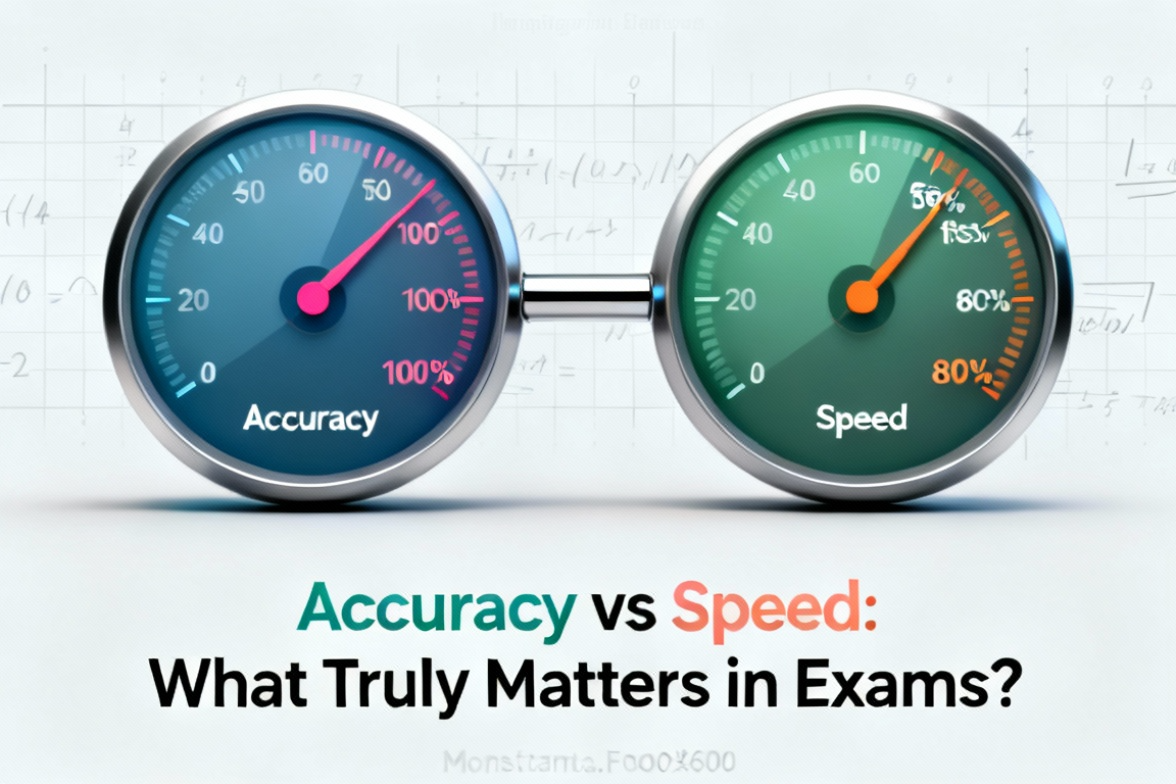Every student preparing for competitive exams faces one major question: Accuracy vs Speed—which one leads to better marks? Many students believe solving more questions quickly will increase their score. But in reality, incorrect answers reduce marks just as fast.
Speed feels good, but accuracy brings marks. A fast wrong answer still gives zero, while a correct answer adds directly to your score. This blog explains why accuracy is more important, how speed helps, and how students can find the perfect balance between both.
Understanding Accuracy and Speed
Speed and accuracy are both important, but they serve different purposes in examination performance.
Accuracy
Accuracy means solving questions correctly. It comes from:
-
Clear concepts
-
Careful reading
-
Focused thinking
-
Fewer mistakes
Speed
Speed means solving questions quickly. It develops from:
-
Practice
-
Time management
-
Pattern recognition
-
Familiarity with the syllabus
Speed helps you attempt more, but accuracy ensures you score more.
Why Accuracy Matters More Than Speed in Exams
Accuracy has a stronger effect on your score than speed. Here’s why:
Negative Marking Makes Accuracy Essential
Most competitive exams include negative marking. Even one wrong answer can reduce marks gained from correct ones. Students who rush often lose marks due to silly mistakes.
Accuracy protects your score. Guessing and rushing don’t.
Correct Answers Improve Rank Faster
Attempted questions don’t decide your rank—correct ones do.
For example:
-
Student A attempts 70 → 65 correct
-
Student B attempts 90 → 55 correct
Despite attempting fewer questions, Student A scores higher because of better accuracy.
Accuracy Shows Real Understanding
Speed may come from shortcuts or guesswork. Accuracy comes from:
-
Strong fundamentals
-
Clear logic
-
Proper reading
-
Concept clarity
Accurate students understand better and perform better.
Accuracy Reduces Stress and Panic
Rushing increases anxiety. Students who focus on accuracy stay calm, think clearly, and make fewer mistakes.
Speed Comes Naturally When Accuracy Improves
Accuracy builds confidence. Confidence increases natural speed.
That’s why toppers say:
“Accuracy first. Speed follows automatically.”
How Speed Helps You Score More
While accuracy is more important, speed still plays a helpful role. Exams are time-bound, so students need speed to:
-
Finish all sections
-
Avoid wasting time
-
Attempt more questions
-
Improve their overall score
But speed is effective only when accuracy is stable.
Accuracy vs Speed: Finding the Balance
The best approach is to develop accuracy first and speed second. Here’s how you can balance both:
Read the Question Properly
Spend a few seconds reading the question carefully. Look for keywords like:
-
NOT
-
EXCEPT
-
WRONG
-
ONLY
A single word can flip the meaning completely.
Practice Regularly
Practice reduces thinking time. Use:
-
Mock tests
-
Previous year papers
-
Chapter-wise practice sets
Regular practice improves both accuracy and speed.
Attempt the Paper in Two Rounds
Round 1: Solve easy and moderate questions quickly but accurately.
Round 2: Attempt difficult or time-consuming ones.
This method saves time and boosts the final score.
Build a Mistake Notebook
Write down mistakes, their cause, and the correct method. Review this notebook weekly to avoid repeating errors.
Strengthen Your Basics
Weak fundamentals reduce both accuracy and speed. Revise:
-
Formulas
-
Key concepts
-
Basic examples
Strong basics reduce confusion.
Don’t Rush Difficult Questions
If a question feels confusing, skip it and return later. This prevents errors and saves time.
Solve Under Real Exam Conditions
Practice using a timer and create exam-like conditions at home. This trains your mind for actual pressure.
Final Verdict: Accuracy vs Speed
So which one matters more?
Accuracy wins. Speed supports it.
Correct answers give you marks. Wrong answers reduce them. Speed becomes meaningful only when accuracy is strong and consistent.
The winning strategy is:
Accuracy + Smart Speed = High Score
Build your accuracy first.
Increase your speed naturally through practice.
When both work together, you score higher in every exam.
Also Read : What No One Tells You About the Last 30 Days Before NEET
University of Queensland – Benefits of Practice Exams



